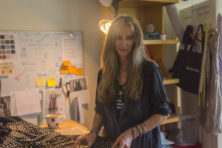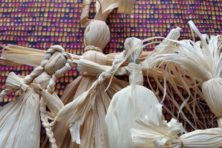Two Dolls at Auction
- Share
- Tweet
- Pin
- Share
All Cathy could feel in the Buick’s passenger seat was gravel rattling underneath her across the car’s bottom, spitting up from the tires as they wove further and further from town: past the red brick school house, its empty playground, the plastic shopping bags clogging its meshed fence. Last month the Herald suggested the school be turned into a county historic museum. Cathy wondered why she even had the paper delivered anymore. All she did was flip near the back anyway – all it was good for – but after Joy, well, she just didn’t see the point in paying to be constantly…
She glanced over to her caretaker, Jane. Jane’s slim white wrists shook at the steering wheel as the car churned along. “Almost there,” Cathy said to her. Jane tried to smile back, little crow’s feet perching up around her eyes. Cathy knew Jane wasn’t any more excited about this than she was running her groceries, but she could at least try, couldn’t she? But Jane was still young at 52. She’d understand, sooner or later.
“You’d think she would’ve had the sense write it all down somewhere or something, where she wanted it to go,” Cathy said. “But, you know Joy.”
Jane nodded, staring forward. She steered the car through a curve, passing the farm Winthrop used to own, past the rows and rows of corn, the new wooden posts with barbed wire strung around them.
“I promise I won’t keep you long. I just thought that it’d be nice…” Cathy sighed as they pulled up to the yellow Estate Sale sign marking Joy’s driveway.
After Jane had finally parked the Buick among the long line of dirt-spattered cars, Cathy saw a dozen hands pop up in the distance. Each held a numbered placard in front of someone standing on a makeshift stage. Cathy stepped out of the car toward it, nearly stumbling to the ground. All the while Joy’s house hung half-tilted over the crowd, its blue window shutters tearing paint chips, as though the whole building was trying to turn and look away, but unable. They started down the slope toward the backyard.
“We’re late,” Cathy said, trying her best to hurry across the scorched-brown grass.
“Hold up. Here we go,” Jane said, letting Cathy grip the back of her paisley shoulder as they dipped down the lawn. Each step fell flat, barely before the other and pinching Cathy’s feet. She looked down at her old veins wriggling against her tight black shoes, like worms rising in rain. Something about the auction’s set up, its graying 50 attendants slumped back in gaudy lawn chairs lined up before some gesturing man, made Cathy think about the old church revivals her great-aunt would tell her about. It looked, though she tried to bury the thought, just like Joy’s funeral. Except there were no flowers here.
The two of them collapsed in a pair of chairs along an aisle near the back of the crowd. There was no room anywhere else. Cathy breathed deep, her whole body slouching down. Jane leaned near her, about to whisper something when the auctioneer called out, “Herewearenowlookat this. Nicelittlehandcarvedfigurehere”
Cathy’s eyes darted up, scanning around the balding and brimmed heads in front of her. Her eyes locked on it: the small, red-painted Santa Clause Joy’s father had carved for her. She tried to follow it, clutched at the waist and tossed about by the man’s bony fingers. A dozen hands waved their numbers again as the auctioneer rattled through dollar amounts Cathy couldn’t make out.
“SOLD! For four dollars fifty cents to number 23 over there. All right, our next item is…”
“Four dollars! After all the work he put into it. Hardly ever saw Joy without that thing,” Cathy said, but could tell that Jane was too busying eyeing inside her purse to notice. “Couldn’t pry it out of her till summer, and even then…”
She shot up her hand, losing her own voice in the auctioneer’s clothes-washer ramble – “For our next item, this fine china set” – and the murmured conversations about her.
“I need to find out where to get one of those number cards. You see ‘em around?” Cathy asked. Jane shook her head as she fumbled inside her purse.
The sun hung just above them now. Cathy could feel it prick the back of her neck as her skin slowly began to burn. She started to sweat. Cathy tried pulling her shirt out from her armpits, hoping no stains had already formed, hoping no one would notice. When she was satisfied that no eyes were fixed on her, Cathy looked back up to see the auctioneer pacing. Now he held Joy’s white porcelain teapot by its petite handle. It looked exactly as it had when she first studied the strange little branches and teardrop leaves etched in the pot’s smooth side. For some reason seeing it held again made her think of how laminated pages feel when you slowly flip them, when they stick to your fingers in summer.
“SOLD! Foreightdollarseventyttothemanupfront. Number 11, is it? There you go.”
Jane tapped Cathy’s back and pointed her toward an unmanned brown poker table to the right of the first row. Several numbered sheets lay there. “There we go,” she said. “Let’s see if we can make it over there.”
Cathy tried to jolt up, but saw the table turn to brown-grey speckles as soon as she got to her feet, her head suddenly light. She tried to walk toward it anyway as the faces around her shriveled up to fuzzy silhouettes in the heat. “Jane,” Cathy reached behind her, only feeling an empty tingling pounding down from her head to her fingers. She closed her eyes and tried to squint the life back into them as the swirling “SOLD! Fortwentythree-fifty. SOLD! Forfoureven. SOLD! For twelveseventy-five” circled her until it was just one sharp buzz.
Through the black and yellow splotches pocking her eyes she could see the auctioneer, could see him staring back into her. A skeleton wrapped in a thin flap of skin, his bald skull glowing under the sun, his arms flailing two crumpled figures, two dolls. Two of Joy’s dolls. The ones she used to make. The ones Cathy stuffed while Joy bit the thread between her teeth and stitched, keeping everything from coming undone. One had Joy’s yellow hair. The other had no face. A work in progress Joy had been making for Cathy, so she said. She had just begun patterning its dress.
Cathy lunged out for it. For a moment she wobbled there, clinging to air trying to stay still, trying not to tip over and shatter like an empty flower vase quavering after some slick peddler of tricks pulled out the linen from the table. Then her right ankle buckled under her and it all spun out. She crashed down, down – her mouth smacking against the cold metal tip of a chair as she fell.
Cathy opened her mouth and tried to breathe. Instead she tasted dirt against her teeth. Like the dirt she and Joy would stain their knees and housedresses with, hiding and seeking in the early August corn when it was at its tallest, before the Winthrop boys would pluck and shuck it all and – “She all right? She ain’t moving. Cananybodysee if she’s all right. Somebody…” – how Daddy would always scold her and how Mamma would cuss her out with her eyes as she scrubbed out the stains by hand but how the next day they’d always let her out to play anyway cause they said they loved her, and so Daddy would rumble down the road in that tin can Chevy to Joy’s house where he’d chat with Joy’s dad who’d be cradling that wood in his hands, shaving off fresh flakes of pine from Santa’s head. Its wood flecks scattered about the living room carpet like little clipped fingernails as she and Joy would chase each other round and round the furniture and round the kitchen, calling each other names she couldn’t remember except somebody was touching her now, trying to hold her hand, but she pulled back cause this was so much better compared to that and if she’d just close her eyes some more she’d black out for good and they’d all be gone and it would just be her and Joy pouring out tea into their cups, making the whole room smell like sweet lemon, when they would just sit, and talk, and laugh, and flip through glossy catalogues, debating which dresses they would wear for the Sadie Hawkins dance, for each other’s weddings.
That same hand clasped around hers again. “Mam,” a rough voice said. “Mam, you hurt? You break anything?”
Cathy tried curling into a ball. “No, just leave me here.”
The voice barked louder, “She’s alright everybody, nothing broken.” The man wrapped an arm around Cathy’s back and whispered, “let’s just move you into one of these nice little chairs where you can relax.”
She started to say no but he pulled her up anyway. As she felt the chair beneath her, Cathy finally opened her eyes to see the back of the man’s bald head before he slipped through the crowd. Now twenty strange faces surrounded her, each picking her apart and cringing. Cathy closed her eyes, held them there, but the faces stared back the same when she opened them again. “Jane,” she called.
Jane squeezed through the crowd, holding out the unfinished doll to her, trying miserably to smile one of her fake crow’s feet smiles. Cathy snatched it and turned her back to the crowd, holding its face to hers, sobbing into it. “Go, all you just go, go!”
Little by little she could hear the feet shuffle dust aside. The people muttered amongst themselves, jostling the lawn chairs as though not sure whether the show would go on. When the only voice Cathy could hear was Jane’s, asking, “Cathy are you hurt? Oh God, Cathy are you ok?” she raised her eyes up from the doll and watched the others fanning out, grumbling across the dead lawn. She looked over to where the lawn met the field. Over where the rusty irrigation line’s ribs rose and fell in the dirt, crossing past the farm’s crumbling silo. Opposite Joy’s farmland a combine rumbled toward the auction, slicing down hay with its giant blades. A gust of diesel smog blew behind it as it scythed closer. She squinted to see the operator, but just saw a far-off black silhouette behind the wheel.
But where was it? She whirled around until at last she saw him, that bony shadow skulking in front of Joy’s house, the yellow-haired doll dangling limp from his hand, dragging her back, back up to the gravel road they came from.
Paul Waldhart’s Bio:
I was born and raised in Eau Claire, Wisconsin, and spend my free time writing and being outdoors. I am a recent graduate of the University of Wisconsin-Madison and will be a Public Policy graduate student there in the fall. My prior publications include NOTA, The Fascicle, and REDzine.



